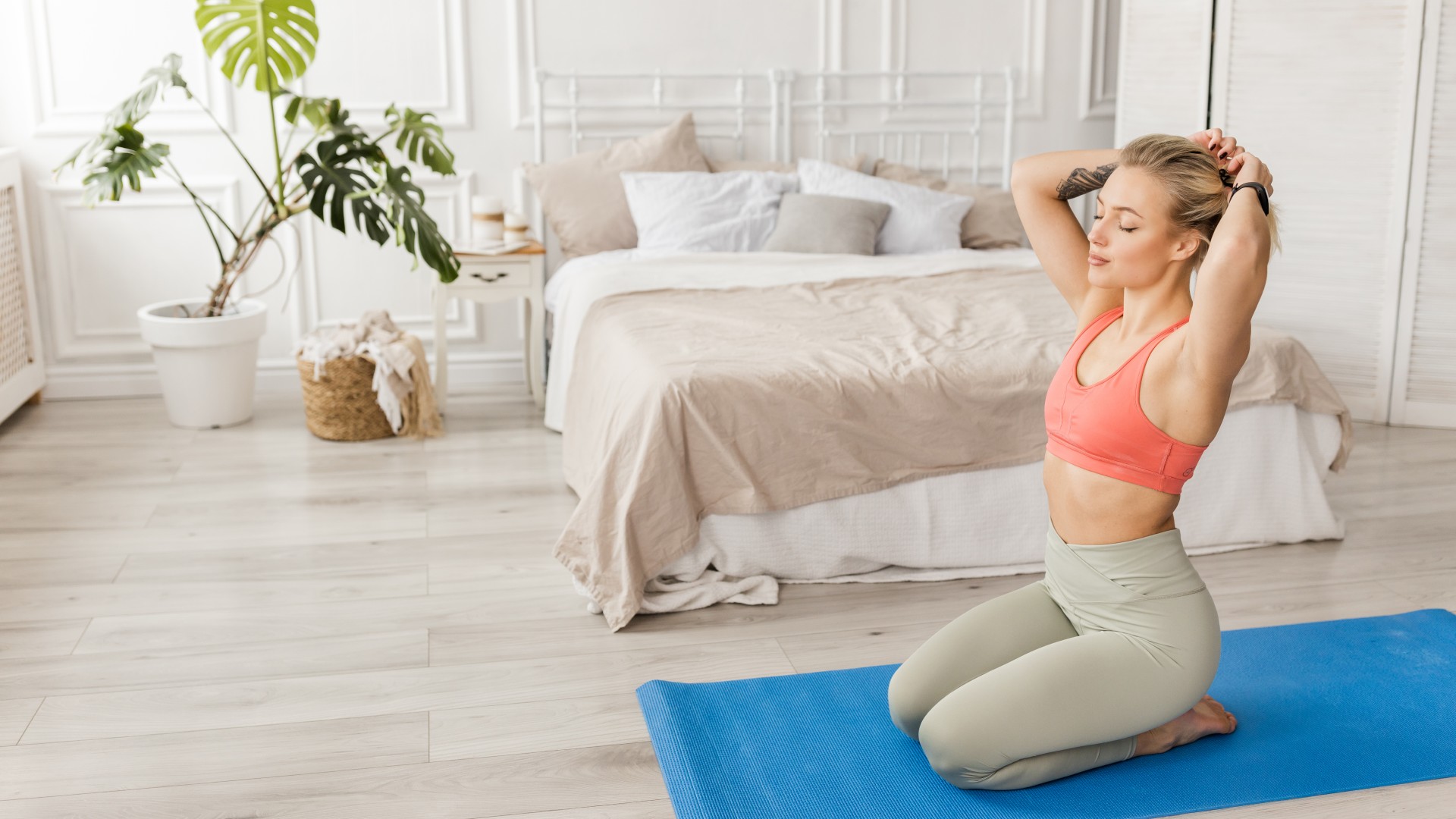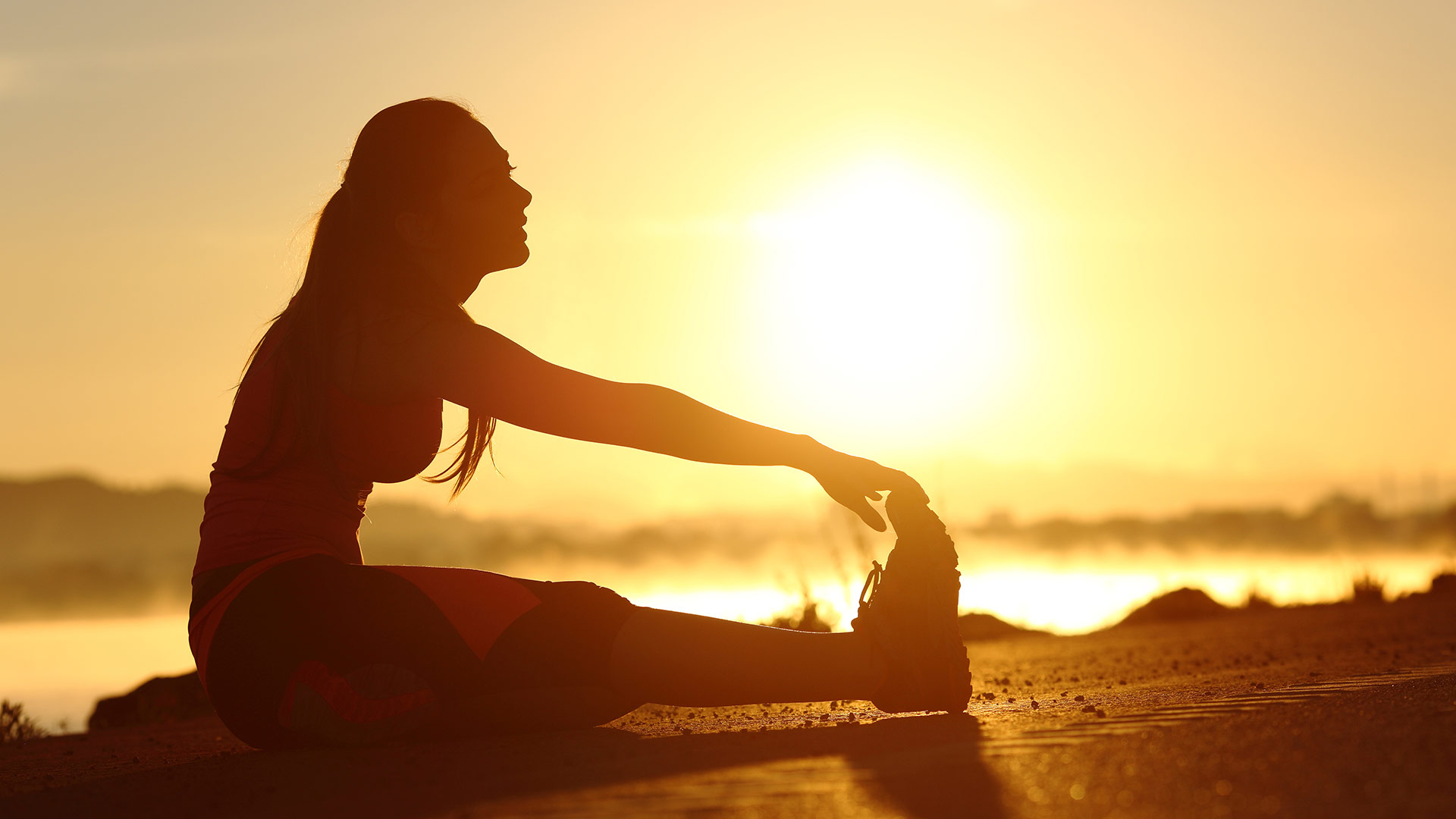
The best time of day to exercise depends on an individual’s lifestyle and goals, but according to science, there’s a “right time” if you want to prioritize your sleep.
Whether you’re trying to improve sleep hygiene or just curious about how to exercise for better sleep, it turns out that choosing between the morning and evening could make a difference.
We’ve trawled some of the existing research and tapped into the expertise of a sleep expert to find out the best time to work out for sleep and how you can improve your slumber with some simple tricks and tips.
What is the best time to work out for sleep?
The benefits of exercise include weight loss, stronger bones, muscles and joints and improved cardiovascular fitness, as backed by research like this Cold Spring Harbor Perspectives in Medicine study.
There’s also a strong relationship between exercise and sleep, with exercise proven to improve sleep quality and sleep contributing toward higher energy levels for exercise. But your timing could matter.

“As well as being essential for overall health, exercise directly impacts your need for deep sleep at night,” Dr Lindsay Browning, neuroscientist, psychologist and sleep expert, tells us.
“The more you exercise, the more deep sleep you will have. Deep sleep helps you to feel refreshed when you wake up and helps with sleep continuity.” It’s also responsible for repairing and replenishing the body, so the amount you can get matters.
Sign up to get the BEST of Tom's Guide direct to your inbox.
Get instant access to breaking news, the hottest reviews, great deals and helpful tips.
There’s no template for sleep and exercise, as everyone sticks to a different routine, and factors like childcare, work, and day-to-day commitments might shake things up. The studies and advice below can help you make some decisions about your routine, but any exercise is better than none, so try to be consistent, flexible and kind to yourself.
Benefits of exercising in the morning

Many people feel most awake in the morning versus the afternoon, with fatigue setting in during the day. Getting exercise out of the way early could help you get the most out of your workout, contributing toward feeling energized and focused.
One school of thought suggests exercising earlier could help exercisers avoid excuses like “I’m too busy” or “I’ll just do it tomorrow,” which set in throughout the day as priorities change.
Morning workouts also increase the likelihood of making better or healthier decisions during the day, partly due to the happy hormones released during exercise like dopamine, serotonin, endorphins and oxytocin.
If you’re exercising for weight loss, fasted-state morning workouts (without food) mean your body won’t draw on carbohydrates and recently consumed food for energy, turning to stored fat instead.
One review published in the journal Sports Medicine suggests that cortisol and testosterone levels may peak in the morning, followed by a drop in glucose and an increase in insulin, which could also improve fat metabolism. Endurance athletes or those who enjoy aerobic exercise could tap into fat metabolism by working out in the morning.

So what about sleep?
The Journal of Physiology suggests that morning exercising could shift your circadian rhythm so that your body becomes more alert in the morning and sleepier later.
A trial published in the Journal of Strength and Conditioning Research found resistance training at any time of day (but with significant differences in morning exercisers) could improve overall sleep quality and the ability to fall and stay asleep.
We turned to Alanna Derrick, certified personal trainer, running coach, yoga teacher, Brazilian Jiu-Jitsu practitioner and Gold BJJ contributor, for advice.
“I generally recommend morning exercise for most people. Cortisol, our body's main stress hormone, is naturally highest in the morning,” she says. “This gives us an energy boost that can enhance athletic performance. Morning exercise also jumpstarts the metabolism, helping you burn more calories throughout the day.”
That said, if you’re setting your alarm super early to fit exercise in, you might be at risk of disrupting your sleep cycle. If you plan on shifting your routine to exercise early, it’s a good idea to first look at the sleep data on one of the best fitness trackers to learn your unique sleep patterns.
Benefits of exercising in the afternoon or evening

Evidence suggests that weight training for muscle growth could be better suited for later in the day when energy levels are higher and the athlete is fed — one study in Applied Physiology, Nutrition, and Metabolism into the effects of morning versus evening strength and endurance training found better results for evening exercisers over a 24-week training period.
Another study by Scientific Reports supports exercising later in the day for “short-duration maximal exercise,” like sprinting or jumping, most likely because your muscles can produce more power and force later in the day, especially if you've eaten, improving overall performance.
While it might be tempting to hit the weights later in the day, Dr Browning advises scheduling carefully, as it could impact sleep quality. “Make sure that you exercise during the daytime and not too close to bedtime, as exercise in the evening can sometimes be disruptive to sleep due to the release of endorphins and adrenaline” that make you feel more alert.
It’s also thought that intense training close to bedtime could delay sleep latency (how long it takes to fall asleep), particularly as some people feel more alert and hyped following workouts like HIIT, CrossFit, or sprinting.
A Sports Medicine systematic review doesn’t support the theory that you shouldn’t train in the evening, suggesting total sleep, latency and efficiency could be impacted by “vigorous exercise ending around an hour or less before bedtime.” In other words, give yourself at least an hour to 90 minutes to develop a calming nighttime routine that doesn’t include high-intensity exercise straight before bed.
Derrick recommends listening to your body, as some are “natural night owls” who may perform better later in the day. “Due to diurnal lung functioning (natural changes in our lung capacity throughout the day), some people may find certain types of exercise feel easier in the evening,” she adds. “Experiment with different times and see what works best for you. The key is to choose a time you can stick with consistently.”
Derrick advises more than 60 minutes between intense exercise and sleep. “Intense exercise elevates cortisol and body temperature, signaling the body to be awake and alert. I recommend allowing at least three hours between intense workouts and bedtime. Low-key exercises like gentle yoga or a leisurely walk can be awesome in the evening and help lower cortisol and promote relaxation, prepping your body for a restful night's slumber.”
The best time to workout for sleep: verdict
Overall, exercise is hugely beneficial for improving sleep quality, latency, and the amount of deep sleep you can get. And there are pros and cons of morning and evening exercise.
We may be naturally inclined to exercise at certain times of the day because of our chronotypes, but if morning workouts don’t fit in with your schedule, there are huge benefits to evening workouts, and vice versa. If you feel more energized, alert and focused in the morning, or consider yourself “a morning person,” exercising early doors could be best for you.
Those who enjoy fasted-state and steady-state cardio, endurance training, or exercising for fat loss may also prefer working out in the morning, and morning or afternoon workouts are a great option if you enjoy heart-raising activities like HIIT.
Strength training could be beneficial for the afternoon or evening, especially if you’re groggy in the mornings or prefer to work out after food. Strength markers tend to be higher, and many people function better later in the day. Your core body temperature may also be elevated in the evening, meaning you’re less likely to get injured.
That said, try to finish workouts at least an hour before bed, and prioritize lower-intensity activities like yoga and Pilates that are gentle and calming for the body very close to bedtime.
However you plan to exercise, it’s a brilliant way to reduce stress and stagnant time spent sitting at a desk, or similar. Exercise can also break up the day and help you transition from “work mode” to an evening of relaxation rather than moving from your desk to the couch.
More from Tom's Guide

Sam Hopes is a level 3 qualified trainer, level 2 reiki practitioner and senior fitness writer at Tom's Guide. She is also currently undertaking her Yoga For Athletes training course. Sam has written for various fitness brands and websites over the years and has experience across brands at Future such as Live Science, Fit&Well, Coach, and T3.
Having worked with fitness studios like F45 and Virgin Active, Sam now primarily teaches outdoor bootcamps, bodyweight, calisthenics and kettlebells. She also coaches mobility and stretching-focused classes several times a week and believes that true strength comes from a holistic approach to training your body.
Sam has completed two mixed doubles Hyrox competitions in London and the Netherlands and finished her first doubles attempt in 1:11.
